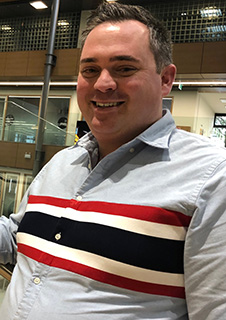A lack of information about candidates is the main reason young people do not vote in local government elections, a new University of Otago study reveals.

Kyle Whitfield.
Doctor of Business Administration student Kyle Whitfield says his research topic “Youth and Local Government – do the two ever meet? Voter turnout of young people in Local Government”, produced some surprising results.
Mr Whitfield, a former governance and support team leader and deputy electoral officer at the Palmerston North City Council, and self-described “political junkie”, surveyed 435 people aged between 18 and 24, in Dunedin and Palmerston North.
Results showed 60% of the 435 participants intended to vote at next month's elections, 25 per cent were undecided, and only 12% had already decided they would not.
Other key findings include:
- 62.5 per cent were not aware of what was happening in local government in the region they were currently living
- 38 per cent thought voting should be compulsory, compared with 35 per cent did not
- Only about 16 per cent thought the voting age should be lowered to 16
- Less than half (38 per cent) said they did not engage in local politics at all. The rest said they either completed submissions, attending meeting, communicated or met with councillors or politicians or read media reports about council.
The 18–24 age group traditionally has the worst voter turnout for elections in New Zealand. According to Stats New Zealand, 70 per cent of eligible voters aged between 18 and 24 voted in the 2014 general election, compared with 78 per cent in the 25-44 group, and 90 per cent and 94 per cent in the 45-64 and 65+ categories respectively.
“Contrary to what some other research has said, young people want to vote, they want to be involved, but they don't feel as they have enough information to make an informed decision,” Mr Whitfield says.
The majority of the people surveyed, who did not vote at the last election, and were eligible to do so, said they did not know enough about the candidates, while 70 per cent of those who did vote, sought further information about the candidates.
“This is contrary to the perception that young people aren't interested, or don't care about politics. In fact, 42 per cent of those who voted in 2016 said they voted because it was their civic duty.
“The statistics show that councils, the Electoral Commission or officialdom should be including more information. Currently the word count for the candidate information booklets is 150 words. This is very inadequate.”
Eighty per cent of those surveyed said they were more likely to vote if there was more information provided and the same number wanted to see civics education part of the high school curriculum - a view shared by the three focus groups conducted as part of the research.
“They all thought there should be more civics education in school, and suggested that in every term, schools do a few hours of election or political education.
“This is massive to young people. They want the knowledge so they can take part in a productive way, but the way the system works means they don't get it,” Mr Whitfield says.
Almost 70 per cent thought online or e/Voting should be an option, with almost a third of those surveyed believing postal voting was not easy or straightforward. However, the majority of comments from participants discussed the need for a robust system if online voting were to be introduced.
“These results suggest we need to have a dual system of how to vote,” he says.
“Keep with the current postal format, but introduce eVoting. It does need to be well planned and not rushed, but we're in the 21st Century and the postal system is not what it used to be.
“People talk about how going to eVoting penalises older generations, but not having eVoting has already penalised young generations. I'm not saying that eVoting is the silver bullet for increasing voter turnout, but it is a start in the right direction.”
For more information, contact:
Kyle Whitfield
Email kyle.whitfield@postgrad.otago.ac.nz
Lea Jones
Communications adviser
Otago Business School
Email lea.jones@otago.ac.nz
Mob +64 21 279 4969
Find an Otago expert
Use our Media Expertise Database to find an Otago researcher for media comment.








